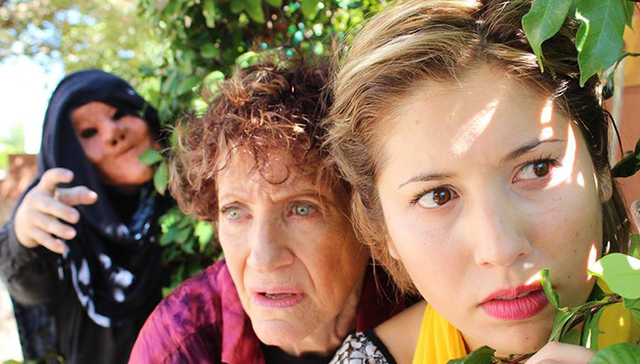Powerful ‘Breadcrumbs’ a fleeting-memory play
Table 8 Productions’ moody presentation of Jennifer Haley’s potent play “Breadcrumbs,” now at Las Vegas Little Theatre, takes us to a place of great emotional depth, though the journey there feels vague. Like the disease around which the drama unfolds, the crumbs that should guide us are sometimes scattered in disarray.
Words are memories and memories are words. Cloistered writer Alida (Gail Romero) is at a loss for them, her mind slowly crumbling from Alzheimer’s. It’s the ultimate betrayal, the author forced to grasp vainly for the tools of her craft.
Young caregiver Beth (Monica Delgado) offers to help capture them, to put her recollections on the page before it’s too late. Together they form an interdependent relationship that both repels and attracts as they struggle to record the fragments of Alida’s past.
A memory play, it rapidly jumps between the past and present, taking us from Alida’s cluttered apartment to flashbacks of a nomadic childhood spent with an emotionally damaged mom (Delgado). As seen through the eyes of her inquisitive child self her stories naturally veer into fantasy, with the mother in search of Prince Charming and the little girl lost in the woods.
In young Alida’s tale of “Hansel and Gretel” there’s no Hansel, the breadcrumbs are eaten by squirrels rather than birds, and the witch’s castle is made of flesh and mucous instead of candy. Thus an already demented story becomes even more so, and we realize that this is an allegory not only for the ravages of dementia but also for her dismal early life.
Haley’s complicated script works on different levels and touches on several themes, not all of them developed. Under the crisp direction of Stephen R. Sisson, the idea of abandonment stands out: abandonment of the mother by the father, of the child by the mother, of the self by the mind. Everyone is lost in one way or another.
Sisson manages the flashbacks well, delineating them so that we know where we are in time and space although occasionally the transitions are awkward. Alida’s childhood scenes with her mother are especially touching, but scenes set in the present between Alida and Beth lack tension. What should be a battle of wills is decidedly one-sided, resulting in a lack of dramatic impact.
The present-day, deteriorating Alida isn’t very nice. She fears that Beth will take advantage of her vulnerability and accuses her of deception. While Beth seems selfless, she is also flaky. Delgado shows us a wholesome Beth with a natural presence, but she should delve deeper and explore her shadowy side. She hasn’t found her stage voice yet, so her Beth lacks dimension, which causes Romero to overcompensate to create traction.
These are complex roles, and Romero and Delgado do share a comfortable, supportive rapport. When Romero is the precocious child Alida and Delgado her loving but troubled mom, the show hums because their relationship is understandable and utterly heartbreaking.
The scenic design, by Harry Huff, echoes the fairy-tale theme with dark-wood furniture representing trees of the forest and colorful sticky notes their fluttering leaves. The notes are also the words lost to dementia and the breadcrumbs that fail to mark the path home. Jennifer McKee’s folksy costumes continue the theme, and Jeremy Gill’s vivid sound design takes us from the comforting yet haunting forest and into the noisy, junglelike city.
In the end, Romero brings things around with a beautifully evocative monologue that ties fairy-tale breadcrumbs and fleeting memories together through the glimpse of a tiny light in the dark. It’s a glimmer of hope indeed.




























